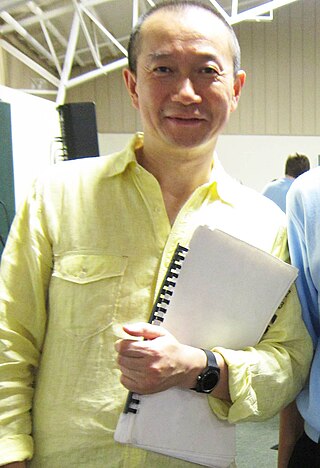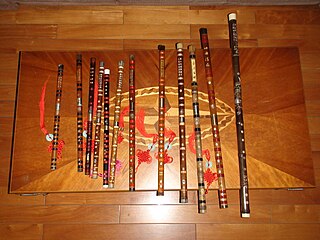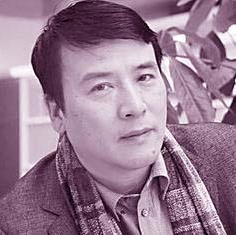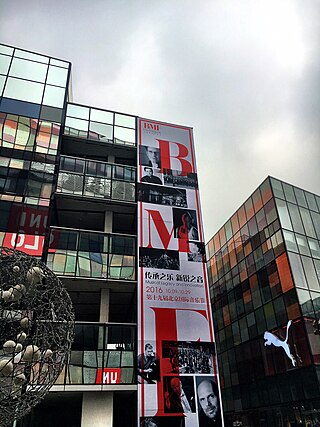Related Research Articles

The music of China consists of many distinct traditions,often specifically originating with one of the country's various ethnic groups. It is produced within and without the country,involving either people of Chinese origin,the use of traditional Chinese instruments,Chinese music theory,or the languages of China. It includes traditional classical forms and indigenous folk music,as well as recorded popular music and forms inspired by Western culture.

The music of Taiwan reflects the diverse culture of Taiwanese people. Taiwan has undergone several economic,social,and political changes through its cultural history,and Taiwanese music reflects those issues in its way. The music of the country has adopted a mixed style. As a country rich in Chinese folk culture and with many indigenous tribes with their own distinct artistic identity,various folk music styles are appreciated in Taiwan. In addition,people in Taiwan highly appreciate various style of Western classical music and pop music. Taiwan is a major Mandopop hub.

Tan Dun is a Chinese-born American composer and conductor. A leading figure of contemporary classical music,he draws from a variety of Western and Chinese influences,a dichotomy which has shaped much of his life and music. Having collaborated with leading orchestras around the world,Tan is the recipient of numerous awards,including a Grawemeyer Award for his opera Marco Polo (1996) and both an Academy Award and Grammy Award for his film score in Ang Lee's Crouching Tiger,Hidden Dragon (2000). His oeuvre as a whole includes operas,orchestral,vocal,chamber,solo and film scores,as well as genres that Tan terms "organic music" and "music ritual."

The dizi,is a Chinese transverse flute. It is also sometimes known as the di or héngdi,and has varieties including Qudi,Bangdi,and Xindi. It is a major Chinese musical instrument that is widely used in many genres of Chinese folk music,Chinese opera,as well as the modern Chinese orchestra. The dizi is also a popular instrument among the Chinese people as it is simple to make and easy to carry.

The ruan is a traditional Chinese plucked string instrument. It is a lute with a fretted neck,a circular body,and four strings. Its four strings were formerly made of silk but since the 20th century they have been made of steel. The modern ruan has 24 frets with 12 semitones on each string,which has greatly expanded its range from a previous 13 frets. The frets are commonly made of ivory or in recent times of metal mounted on wood. The metal frets produce a brighter tone as compared to the ivory frets. It is sometimes called ruanqin,particularly in Taiwan.
Chen Yi is a Chinese-American composer of contemporary classical music and violinist. She was the first Chinese woman to receive a Master of Arts (M.A.) in music composition from the Central Conservatory of Music in Beijing. Chen was a finalist for the 2006 Pulitzer Prize for Music for her composition Si Ji,and has received awards from the Koussevistky Music Foundation and American Academy of Arts and Letters,as well as fellowships from the Guggenheim Foundation and the National Endowment for the Arts. In 2010,she was awarded an Honorary Doctorate from The New School and in 2012,she was awarded the Brock Commission from the American Choral Directors Association. She was elected to the American Academy of Arts and Letters in 2019.
Qu Xiao-Song is a Chinese composer of contemporary classical music.

Ye Xiaogang is a Chinese composer of contemporary classical music.

Guo Yue is a virtuoso of the dizi and bawu. He was born in Beijing,China during the period of the Cultural Revolution. He plays a wide range of the bamboo flute and currently lives in London. He has recorded for Peter Gabriel's Real World label. He is also dedicated to cooking,and has found ways of combining cookery with flute playing at some of his concerts.
Malaysian contemporary music is an artistic phenomenon within Malaysia that has its roots in the 1980s with pioneer composers like Valerie Ross. However,little information about that period exists in written sources. The genre gained visibility and momentum only in the new millennium due to the internet phenomenon,and in 2002 in particular,when the Malaysian Philharmonic Orchestra (MPO) programmed several works by Malaysian composers,namely Chong Kee Yong's Echoed Dream (2002),Sunetra Fernando's 'Wayang' (2002) and Tazul Izan Tajuddin's Sebuah Tenunan III (2003). They represent the first local commissions by a professional symphony orchestra in the country. Interest in orchestral music by Malaysian composers grew and when the orchestra held its first Forum For Malaysian Composers in 2003 the event was a triumph for the local music scene.

Zhou Yi is a Chinese pipa player.
Xu Ying is a Chinese librettist.
Xu Yi is a Chinese-born French composer and music educator in France.
Poet Li Bai is a Chinese-language chamber opera by Guo Wenjing to a libretto by Diana Liao (廖端丽) and Xu Ying (徐瑛) on the subject of the poet Li Bai. It was premiered,with subtitles,7 July 2007 at the Central City Opera House,Central City,Colorado,directed by Lin Zhaohua,conducted by Ed Spanjaard,and produced by Martha Liao. Subsequently,the opera was performed in Beijing and Hong Kong
Li Liuyi is a Chinese director and playwright of Beijing People's Art Theatre. His theory "Pure Drama" and his related exploration in the field are known as "Li Liuyi Methodology",which is widely acclaimed and researched. Japanese modern theater master Tadashi Suzuki calls him "The most influential stage artist of Asia in the new century".

The Beijing Music Festival (BMF) is an annual music festival held in Beijing which according to the Chinese Ministry of Culture has become one of the most well-known musical events in the world,drawing international attention. According to Chinaculture.org the festival presents about 30 concerts in October every year offering a wide variety of classical and jazz music including opera,orchestral,chamber,solo,and choral concerts. BMF also gives prominence to music education and community engagement offering free children's concerts and students' concerts,as well as master classes which draw about 6,000 music students,teachers,and spectators. It prides itself in presenting both Western and Chinese music alike.
Tang Junqiao is a Chinese educator,musician and practitioner of the Dizi. She has performed traditional Chinese music with orchestras worldwide including the New York Philharmonic,London Symphony Orchestra and Bamberg Symphony. In the year 2000 she performed on the soundtrack of the Chinese martial arts film Crouching Tiger,Hidden Dragon which went on to win multiple awards for its musical score.
Chris Hung is a Hong Kong composer and teacher.
Guo Yi is a Chinese musician and master of the ancient free-reed Sheng. He also plays the bamboo flute and Erhu. He has recorded for Peter Gabriel's Real World Records. He performs as the Guo Brothers with his sibling,Guo Yue.
Guo Feng is a Chinese songwriter and singer. He is renowned as a pioneer of original Chinese pop music. During the 1980s,when pop music in mainland China was still in its infancy and mainland pop singers mostly covered songs from Hong Kong,Taiwan,and from overseas,Guo Feng wrote a large number of popular original songs.
References
- ↑ "Guo Wenjing". brahms.ircam.fr. Retrieved 2024-05-13.
- 1 2 3 "Guo Wenjing". www.ricordi.com. Retrieved 2024-05-13.
- ↑ "Our composer Wenjing Guo". Universal Edition. Retrieved 2024-05-13.
1. Chinaculture, Guo Wenjing.
2. Ibid.
3. The Post And Courier, Review: 'Feng Yi Ting' a wonder of culture, sound and story.
4. The New York Times, All the World On a Stage In America.